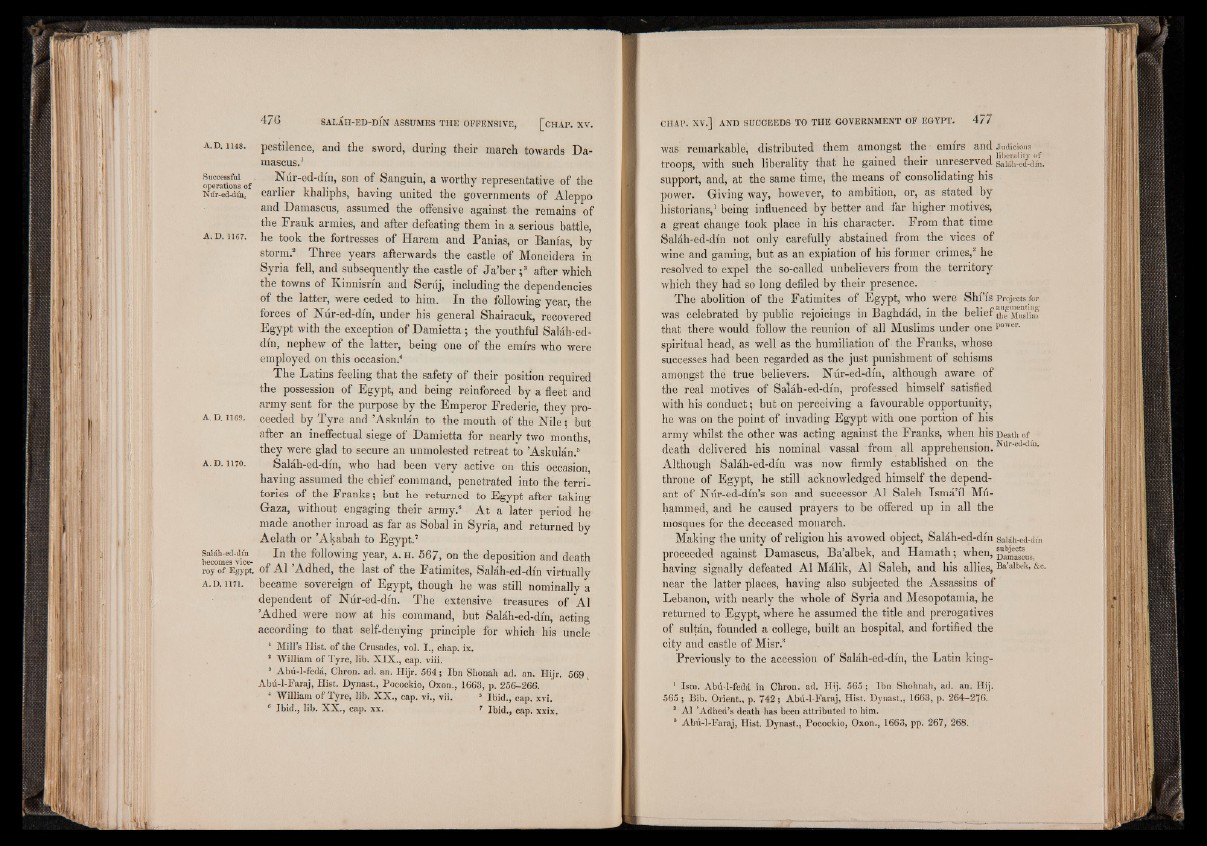
Successful
operations of
Niir-ed-dm*
A.D. 1167.
A. D. 1169.
A. D. 1170.
Saláh-ed-dín
becomes viceroy
of Egypt.
A.D. 1171.
pestilence, and the sword, during their march towards Damascus.
1
Nur-ed-din, son of Sanguin, a worthy representative of the
earlier khaliphs, having united the governments of Aleppo
and Damascus, assumed the offensive against the remains of
the Frank armies, and after defeating them in a serious battle,
he took the fortresses of Harem and Panias, or Banias, by
storm.2 Three years afterwards the castle of Moneidera in
Syria fell, and subsequently the castle of Ja’ber ;s after which
the towns of Kinnisrin and Seruj, including the dependencies
of the latter, were ceded to him. In the following year, the
forces of Nur-ed-din, under his general Shairaeuk, recovered
Egypt with the exception of Damietta; the youthful Salah-ed-
din, nephew of the latter, being one of the emirs who were
employed on this occasion.4
The Latins feeling that the safety of their position required
the possession of Egypt, and being reinforced by a fleet and
army sent for the purpose by the Emperor Frederic, they proceeded
by Tyre and ’Askulan to the mouth of the N ile ; but
after an ineffectual siege of Damietta for nearly two months,
they were glad to secure an unmolested retreat to ’Askulan.8
Salah-ed-din, who had been very active on this occasion,
having assumed the chief command, penetrated into the territories
of the Franks; but he returned to Egypt after taking
Gaza, without engaging their army.6 At a later period lie-
made another inroad as far as Sobal in Syria, and returned by
Aelath or ’Akabah to Egypt.’
In the following year, a . h . 567, on the deposition and death
of A1 ’Adhed, the last of the Fatimites, Salah-ed-din virtually
became sovereign of Egypt, though he was still nominally a
dependent of Nur-ed-din. The extensive treasures of A1
’Adhed were now at his command, but Salah-ed-din, acting
according to that self-denying principle for which his uncle
1 Mill’s Hist, of the Crusades, vol. I., chap. ix.
3 William of Tyre, lib. X IX ., cap. viii.
3 Abu-l-feda, Chron. ad. an. Hijr. 564; Ibn Slionah ad. an. Hijr. 569,
Abu-l-Faraj, Hist. Dynast., Pocockio, Oxon., 1663, p. 256-266.
4 William of T yre, lib. X X ., cap. vi., vii. 5 Ibid., cap. xvi.
was remarkable, distributed them amongst the ■ emirs and judicious ^
troops, with such liberality that he gained their unreserved saidu-eiídín.
support, and, at the same time, the means of consolidating his
power. Giving way, however, to ambition, or, as stated by
historians,1 being influenced by better and far higher motives,
a great change took place in his character. From that time
Saláh-ed-dín not only carefully abstained from the vices of
wine and gaming, but as an expiation of his former crimes,2 he
resolved to expel the so-called unbelievers from the territory
which they had so long defiled by their presence.
The abolition of the Fatimites of Egypt, who were Shi’is Projects for
was celebrated by public rejoicings in Baghdád, in the belief th f Muslim
that there would follow the reunion of all Muslims under one Power-
spiritual head, as well as the humiliation of the Franks, whose
successes had been regarded as the just punishment of schisms
amongst the true believers. Núr-ed-dín, although aware of
the real motives of Saláh-ed-dín, professed himself satisfied
with his conduct; but on perceiving a favourable opportunity,
he was on the point of invading Egypt with one portion of his
army whilst the other was acting against the Franks, when his Death of
death delivered his nominal vassal from all apprehension. Nur'ed'dln‘
Although Saláh-ed-dín was now firmly established on the
throne of Egypt, he still acknowledged himself the dependant
of N úr-ed-dín’s son and successor A1 Saleh Ismá’íl Mú-
hammed, and he caused prayers to be offered up in all the
mosques for the deceased monarch.
Making the unity of religion his avowed object, Saláh-ed-dín Saláh-ed-dín
proceeded against Damascus, Ba’albek, and Hamath; when, Damascus,
having signally defeated Al Málik, Al Saleh, and his allies, ba’aibck, &c.
near the latter places, having also subjected the Assassins of
Lebanon, with nearly the whole of Syria and Mesopotamia, he
returned to Egypt, where he assumed the title and prerogatives
of sultán, founded a college, built an hospital, and fortified the
city and castle of Misr.3
Previously to the accession of Saláh-ed-dín, the Latin king-
1 Ism. Abú-1-fedít in Chron. ad. Hij. 565; Ibn Shohnah, ad. an. Hij.
565 ; Bib. Orient., p. 742; Abú-1-Faraj, Hist. Dynast., 1663, p. 264-276.
3 A1 ’Adhed’s death has been attributed to him.
3 Abú-1-Faraj, Hist. Dynast., Pocockio, Oxon., 1663, pp. 267, 268.